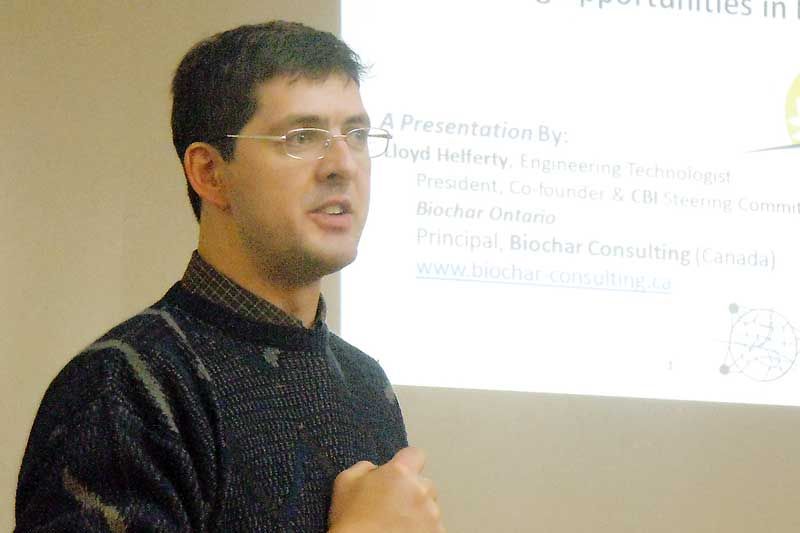Mar 27, 2014
Lloyd Helferty is an engineering technologist and the president and co-founder of Biochar Ontario. On March 22 he gave a talk titled “The Landscape of Biochar in Canada: Exciting Opportunities in Biocarbon” to a group of Green Party supporters at their annual fundraising dinner, which was held at the community hall in Maberly.
Helferty spoke at length about the practical applications of Biochar, which he defined as a “fine grained charcoal, high in organic carbon and largely resistant to decomposition.”
Helferty said that Biochar is not the same product as the charcoal that people burn in barbeques nor is it the chunks of charcoal one finds in the ash of their wood stoves. Rather, it is produced by a process called pyrolysis, which he defined as the “thermal degradation of biomass in the absence of oxygen.”
The result of pyrolysis is that the carbon in the plant matter becomes “fixed” in carbon structures that do not easily degrade. According to Helferty, Biochar's most beneficial applications are as a soil amendment due to its enhanced nutrient retention properties and its ability to reduce fertilization requirements while also protecting soil from the negative effects of climate and environmental impact. In the information that accompanied his presentation, Helferty said that “Char-amended soils have shown 50-80% reductions in nitrous oxide emissions and have reduced the runoff of phosphorous into surface waters as well as reduced the leaching of nitrogen into ground water”.
Helferty stated that Biochar can offer “potential synergies between enhanced soil fertility and food security, the production of green energy and the reduction of atmospheric carbon dioxide”.
He said that the long-term applications of Biochar can be used to “transition to long-term sustainable soil management practices while simultaneously enhancing the biological fertility of soil since Biochar increases porosity in most soils and can also increase the absorption rates of water in soil, thereby reducing the effects of water runoff”.
He said that Biochar also acts as a filter, thereby helping to protect and purify water sources.
Helferty's aim through Biochar Ontario is to source out and apply the various environmental and industrial uses for Biochar, many of which he highlighted in his presentation.
These included uses in agriculture as a soil conditioner and fertilizer substrate, uses in water filtration systems, functional clothing, insulation, civil engineering, energy storage systems, feed supplements in animal husbandry, as well as applications in the agro-forest industry.
Regarding its long list of possible applications Helferty said, “I consider carbon to be one of the most versatile atoms in the world and it has this capacity to be used in so many beneficial ways. It's kind of like a Lego building block in that it can be used to build so many different things at a micro-scale.”
Asked what he sees as the most ideal development and use of the product in Canada Helferty said that ultimately he sees the Biochar being used in the Canada's mining sector.
“Canada has a very strong mining industry and if we could develop a mining project, perhaps in a foreign country where mining practices can often have serious negative impacts on the land, utilizing Biochar would be a greatly beneficial, particularly in the case of open pit mining.”
Helferty went on to say that on a international level, Biochar could be used to reclaim much of the desert lands that are spreading rapidly in many countries around the world.
Although Canada is set up potentially to benefit from the many applications of Biochar, it has yet to kick start the industry, although a number of studies and research programs carried out in the 1980s showed promise. That and the fact that most of the land in Canada is fertile means that the product has yet to be explored in depth.
However, Helferty said that companies and organizations all over the world are making headway in their own studies regarding the potentials of Biochar and that he hopes to see Canadian companies and industries in the near future increase their explorations into this product.
More Stories
- The Resurgent Sharbot Lake County Inn and Crossing Pub
- Towards Then End of Trail
- Silver Lake Pow Wow
- Central Frontenac Declares Former Office, Harvey Building, Surplus Properties
- Neighbours Could Lose The War Over Gravel Point - But Still Win The After Battle
- Sydenham Legion Bass Tournament
- From Performing Arts To The Written Word
- Legion Corner
- The Sun Shines On The Parham Fair
- Creating Your Own Weather, Forever and Ever

